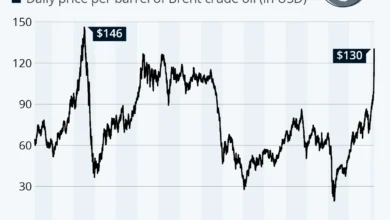US Stock Market Decline: Tariffs Cause Major Shock

The recent US stock market decline has sent shockwaves through the financial world, intensifying fears of a looming economic recession. Triggered by retaliatory tariffs imposed by China in response to aggressive measures from the Trump administration, this downturn marks one of the worst weeks for American equity indices in years. As major indices like the S&P 500 tumbled nearly 6%, analysts are diligently conducting stock market analysis to uncover the ripple effects of this trade conflict. The implications of these tariffs extend beyond the immediate market reaction, potentially altering the global trade system and increasing recession risks not just for the US, but around the world. With tensions escalating in the China-US trade war, the landscape of international commerce hangs in the balance, prompting urgent discussions about the stability of our economic future.
The recent turmoil in the American equity markets reflects deeper economic undercurrents as tensions rise globally. Analysts are scrutinizing the implications of stringent trade measures implemented by the US, which have sparked a wave of retaliation from other nations. With the stock market grappling to maintain stability amidst these fluctuations, concerns about an impending economic slowdown are becoming increasingly pronounced. As tariff escalations threaten to overhaul established trade relationships, experts are evaluating the long-term effects on growth and consumer confidence, signaling potential challenges ahead for the global economy. This intricate web of trade dynamics highlights the interconnectedness of today’s markets and the far-reaching consequences of geopolitical decisions.
The Impact of Tariffs on the US Stock Market
The escalating trade tensions marked by tariffs have led to unprecedented volatility in the US stock market. With the announcement of fresh tariffs on imports, particularly affecting key goods from China, the market reacted strongly, plummeting over 5% across major indices. This alarming decline reflects investors’ fears about the long-term implications of a trade war and its potential to disrupt supply chains, increase costs, and erode corporate profits. Analysts warn that if these tariffs remain in effect, the ripple effects will likely be felt across multiple sectors, affecting everything from manufacturing to consumer goods.
The rapid descent of stock prices indicates a panic response among investors who have historically relied on stable trade relations for securities growth. The sharp downturn observed on Friday, with the S&P 500 experiencing its worst weekly performance since the peak of the pandemic in 2020, underscores the direct correlation between tariffs and market performance. The anticipation of reduced US consumer spending due to rising prices will amplify fears of an economic contraction, leading to a more prolonged market slump.
Frequently Asked Questions
How are tariffs impacting the US Stock Market Decline?
The recent US Stock Market Decline has been significantly influenced by the announcement of new tariffs on imports initiated by the Trump administration. These tariffs, particularly on goods from China and other allies, have led to retaliatory measures, creating uncertainty in the market. This uncertainty often translates into lower investor confidence, causing stock prices to fall sharply, as evidenced by the S&P 500’s near 6% drop. As tariffs contribute to potential economic recession risks, investors are wary of future market developments.
What role does the China US trade war play in the US Stock Market Decline?
The ongoing China US trade war is a major factor contributing to the US Stock Market Decline. As China retaliates against US tariffs, fear spreads among investors about economic slowdowns and trade disruptions, causing significant losses across major indices. The unpredictability of trade negotiations adds to the market’s volatility, making the trade war a crucial topic for understanding the current downturn.
What stock market analysis reveals about the US Stock Market Decline?
Current stock market analysis highlights that the US Stock Market Decline is largely driven by external factors such as tariffs and geopolitical tensions. Analysts point out that sectors dependent on international supply chains, like technology and consumer goods, are particularly vulnerable. The sharp declines across indices suggest a lack of investor confidence, emphasizing the importance of cautious stock market analysis during times of heightened tariffs and trade conflicts.
Are economic recession risks affecting the US Stock Market Decline?
Yes, economic recession risks are a significant factor in the US Stock Market Decline. Recent forecasts indicate a rising chance of global economic downturn due to tariffs and trade wars, which could potentially decrease US growth by 2 percentage points. The market’s reaction to these risks reflects investor anxiety about the economy’s stability, directly impacting stock prices and leading to declines across major indices.
How does the global trade system overhaul relate to the US Stock Market Decline?
The proposed overhaul of the global trade system by the Trump administration has created uncertainty that is closely tied to the US Stock Market Decline. As tariffs are imposed and trade agreements are reconsidered, markets react negatively to the potential for long-term economic disruption. Investors are concerned about the viability of existing trade relationships, which contributes to the widespread declines in stock indices.
| Key Point | Details |
|---|---|
| US Stock Indices Decline | All three major US stock indices fell over 5%, with the S&P 500 down nearly 6%, indicating the worst week since 2020. |
| Global Market Impact | The global stock market lost trillions in value as many countries faced potential recessions due to Trump’s tariffs. |
| China’s Retaliation | In response to US tariffs, China imposed a 34% tax on US goods and restricted exports of critical minerals. |
| Economic Forecast | JP Morgan raised the likelihood of a global recession to 60%, predicting a 2% drop in US growth due to tariffs. |
| Investor Reactions | Many investors see the market shifts as corrections following a long period of growth; however, caution remains high. |
| Trade Policy Outlook | EU officials and other nations express hope for negotiations despite mixed signals from the US. |
| Local Business Sentiments | Small business owners brace for significant price increases due to tariffs, leading to uncertainty. |
| Sector Performances | Sectors like healthcare and utilities, typically less affected by tariffs, also witnessed declines. |
Summary
The US Stock Market Decline has marked a significant downturn for investors and the broader economy, primarily driven by escalating trade tensions between the US and China. With major indices experiencing their worst performance since 2020, the potential for a prolonged trade war raises concerns not just for American markets but for global economic stability as well. As retaliatory tariffs and increased costs loom, businesses and consumers alike are left bracing for an uncertain financial future. The interplay of these trade policies not only impacts market confidence but also has far-reaching implications, prompting a careful reevaluation of economic prospects and investment strategies.




